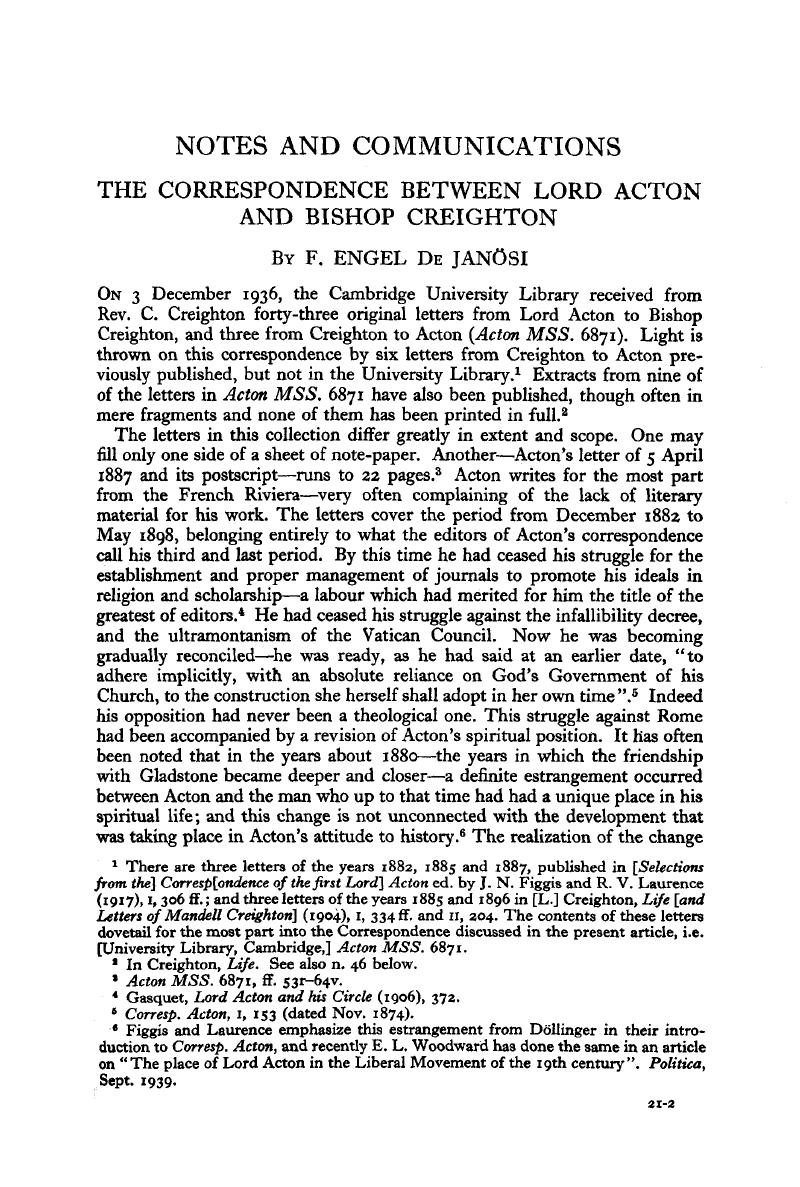No CrossRef data available.
Article contents
The Correspondence between Lord Acton and Bishop Creighton
Published online by Cambridge University Press: 20 December 2011
Abstract

- Type
- Other
- Information
- Copyright
- Copyright © Cambridge University Press 1940
References
1 There are three letters of the years 1882, 1885 and 1887, published in [Selections from the] Correspondence of thefirstLord] Acton ed. by Figgis, J. N. and Laurence, R. V. (1917), 1, 306 ff.Google Scholar; and three letters of the years 1885 and 1896 in [L.] Creighton, , Life [and Letters of Mandell Creighton] (1904), 1, 334 ff. and II, 204Google Scholar. The contents of these letters dovetail for the most part into the Correspondence discussed in the present article, i.e. [University Library, Cambridge,] Acton MSS. 6871.
2 In Creighton, Life. See also n. 46 below.
3 Acton MSS. 6871, ff. 53r-64v.
4 Gasquet, , Lord Acton and his Circle (1906), 372Google Scholar.
5 Corresp. Acton, 1, 153 (dated Nov. 1874).
6 Figgis and Laurence emphasize this estrangement from Döllinger in their introduction to Corresp. Acton, and recently E. L. Woodward has done the same in an article on “The place of Lord Acton in the Liberal Movement of the 19th century”. Politica, Sept. 1939Google Scholar.
7 Acton MSS. 6871, 16 April [1887]Google Scholar.
8 Shorter, C., “Lord Acton's Hundred Best Books” in Pall Mall Magazine, XXXVI (1905), 4fGoogle Scholar. and Lord Avebury, “Lord Acton's List of Books”, Ibid. 641 ff.
9 Acton MSS. 5472. “On Reading.”
10 See Acton's Reviews in [W.A.] Shaw, , [A] Bibliography [of the Historical Works of Creighton, Stubbs, Gardiner and Acton (1903)]Google Scholar.
11 Creighton to Acton, 18 Nov. 1897 in Creighton, , Life, 11, 204Google Scholar; not contained in Acton MSS. 6871.
12 Creighton, , Life, 1, 275Google Scholar. Creighton writes, 2 Dec. 1884: “Tomorrow I am going to London to meet at dinner Lord Acton whom I have long been pining to see. He is… the most learned Englishman now alive, but he never writes anything.”
13 Vol. 22 (1882), 407 ff. The review is not mentioned in Shaw, Bibliography. As the Academy mentions Acton as a contributor, an examination of its columns in the relevant period might be useful in revealing the extent of his collaboration.
14 Home and Foreign Review, July 1863, 285 ffGoogle Scholar. The Abbé Magnan had appeared as “uncompromising defender” of the papal policy at Avignon, and this attitude of his towards the past was not unconnected with the position he took up in the controversies of his own time. “His sympathies nicely balanced between his country and his religion fit him admirably to be the advocate of those ideas which may yet bring the Holy See for a moment under the supremacy of France, and his book is more curious as a sign of the times in which it is written than as a record of those it describes.” Ibid. 285.
15 “The Borgias and their latest Historian” in The North British Review, Jan. 1871Google Scholar, reprinted in Acton, Historical Essays and Studies, 65-84. See p. 83 for Acton's judgment on Alexander VI: “His purpose was not to dismember the state, but to consolidate part of it in such a way that his descendants should be the servants and yet the masters of his successors, and a dynasty of Borgias should protect and should control the Papacy. There was ruin in the scheme, but not the obvious ruin commonly supposed. It was not inspired by religion or restrained by morality, but it was full of intelligent policy of a worldly sort.”
16 14 Dec. 1882; cf. Creighton, , Life, I, 228 ffGoogle Scholar.
17 Ibid. I, 280.
18 Ibid. I, 333.
19 Acton MSS. 6871, 25 July 1885Google Scholar.
20 Ibid. 14 Aug. 1885.
21 Ibid. 9 Sept. 1885.
22 Ibid. 17 Sept. 1885.
23 Creighton to Acton, 21 Sept. 1885, in Corresp. Acton, 1, 308.
24 Acton MSS. 6871. 31 July 1885Google Scholar. J. Stevenson, the historian, entered the Society of Jesus in 1887.
25 Ibid. 31 July 1885. “Renouf spent a year at Cambridge and must be known to many of your friends. He starts as an Orientalist, equally Indo-European and Semitic, and gave as such the Hibbert Lecture on Egypt.” Acton mentions other English Catholic scholars who might be asked to contribute and then adds, “Forgive me if some men I speak of have secretly died ”. On Acton's connection with Sir Peter Le Page Renouf (1822-97, received into the Roman Catholic Church 1842) see also Corresp. Acton, 1, 162 ff.
26 Acton MSS. 6871, 14 Aug. and 16 Nov. 1885Google Scholar. Cory, W. J. (1823-1892) published his Guide to Modern History, 1815-35 in 1882Google Scholar.
27 Acton MSS. 6871, 31 July 1885Google Scholar.
28 Ibid. 29 Nov. [1889].
29 Acton to Creighton, 28 July, 6 Aug. 1886, in Creighton, , Life, 1, 334 f.Google Scholar; not in Acton MSS. 6871. Cf. also Creighton to Acton, 21 Nov. 1885Google Scholar, in Corresp. Acton, I, 308 f.
30 Published in the E[nglish] H[istorical] R[eview], Vol. 1 (1886)Google Scholar; reprinted in Historical Essays and Studies, 344-92. Cf. Acton to Creighton, 26 Dec. 1885, Acton MSS. 6871: “Pray put Wegele's tide where you please but do not abolish the allusions which make the article appear to be really a review of him.”
31 Acton MSS. 6871, 26 Dec. 1885Google Scholar.
32 Gooch, G. P., History and Historians in the 19th Century (1920), 385Google Scholar.
33 Meinecke, F., Entstehung des Historismus (1936)Google Scholar. For Acton's opinion on Ranke see also the essay in Chronicle, The, 20 July 1867Google Scholar.
34 Acton MSS. 6871, 17 Sept. 1885Google Scholar.
35 Ibid. 5 April 1887. Acton had dealt with Schlosser, Häusser and Gervinus as representatives of the Heidelberg School.
36 Acton to Gladstone, 2 May 1888, in Corresp. Acton, 1, 214.
37 Acton MSS. 6871, 19 Jan. 1886Google Scholar.
39 Acton MSS. 6871, 25 Jan. 1887Google Scholar.
40 Ibid. 22 March 1887, published in part, under the date 11 March, in Creighton, , Life, 1, 369Google Scholar.
41 29 March 1887, in Creighton, , Life, 1, 369Google Scholar.
42 Acton MSS. 6871, 29 March [1887]Google Scholar.
43 Creighton's letter is missing, but see Ibid. Acton to Creighton, 5 April 1887.
44 Acton to Lady Blennerhassett, May 1887, in Corresp. Acton, I, 281 f.
45 A systematic review of Acton's thought must at the present time take its start in the two works of Noack, Ulrich: Geschichtsunssenschaft und Wahrheit (1935)Google Scholar and Katholizität und Geistesfreiheit (1936). These works, however, might be expanded or corrected in points of detail.
46 The fragments of this letter of 5 April 1887 published in Creighton, , Life, I, 371 fGoogle Scholar. and in the Appendix to the Historical Essays and Studies are inadequate.
47 See Woodward, E. in Politica, Sept. 1939, 259 f., 263Google Scholar; Noack, , Gesckichtswissenschaft und Wahrheit, 174Google Scholar.
48 The same view of the Papacy is to be found in Paul, H.: Letters of Lord Acton to Mary Gladstone (under the date 19 June 1884), 147 fGoogle Scholar. “A man's opinion of the Papacy is regulated and determined by his opinion about religious assassination.”
49 Acton MSS. 4871. “Conversation on Church History held with my father at Tegernsee.” Summer, 1870Google Scholar.
50 Historical Essays and Studies, 435. Since the ‘70’s Acton had become estranged from Cardinal Newman, whose intellectual abilities, however, he always rated very highly. A judgment upon Newman which has relevance for this period is to be found in a letter of 12 April 1896 in Corresp. Acton, 1, 227. In a letter to Gladstone, 14 Aug. 1890, Acton describes Newman as “the greatest of your contemporaries ”. Ibid. 1, 59.
51 Creighton, , Life, I, 368Google Scholar. Creighton, M., History of the Papacy, III, viGoogle Scholar.
52 Corresp. Acton, I, 381. Acton to Lady Blennerhassett, May, 1887.
53 Letters of Lord Acton to Mary Gladstone, 107 and 148 (under the dates 21 March 1882 and 19 June 1884); see also The Chronicle, 30 March 1867Google Scholar.
54 All the Canons save part of the first are printed in the Appendix to Acton: Historical Essays and Studies, 505 ff.The first sentence reads as follows: “Advice to those about to write history—don't. Visit the Monte Purgatorio as Austin called the Magnesian Rock that yields Epsom Salt or get rid of Hole and Corner Buffery.”
55 A later letter of the same month speaks of the “modern world since Petrarca, when we know the insides of men, and earlier times when we see them in a glass ”. That is the opinion of Jakob Burckhardt, and Dilthey shared it, but cf. Misch, G., Geschichte der Autobiographie (1907)Google Scholar.
56 Corresp. Acton, 1, 281 f., dated May 1887Google Scholar.
57 Acton MSS. 6871, April 1887Google Scholar. Woodward's remark on Acton's “Pessimistic Judgement” ( Politico, Sept. 1939, 263Google Scholar) does not take account of this.
58 Creighton to Acton, 9 April 1887, published completely, except for one unimportant remark about Lea, in Creighton, , Life, 1, 372–5Google Scholar. (The original bears no date.) Creighton expresses a similar point of view in his letter of 12 April 1887 to R. L. Poole, where he presents as his motto: mentem mortalia tangunt. Ibid. I, 376.
59 Creighton to Acton, 12 April [1887], in Corresp. Acton, 1, 309 f.
60 The review was published in E.H.R. 1887, and reprinted in Historical Essays and Studies, 436-41.
61 Acton MSS. 6871, 16 April 1887Google Scholar. The review of Seeley's, Short History of NapoleonGoogle Scholar, published in E.H.R. 1887Google Scholar, was reprinted in Historical Essays and Studies, 442-58.
62 Acton MSS. 6871, 30 July [1888]Google Scholar; cf. Ibid. 20 January 1889.
63 Ibid. 5 Sept. [1888]. The letter is written from St Martin on the French Riviera. The review in question is in E.H.R. 1888Google Scholar, and is reprinted in Acton: [The] History of Freedom [and other Essays], 551-74. On 20 Jan. 1889 Acton wrote to Creighton: “Lea protests with sufficient dignity to cover what to me seems absurd. I cannot deny the coincidence of dates.” By reference to this sentence it becomes evident that the letter which follows in Acton MSS. 6871 belongs to the year 1889.
64 Acton, , History of Freedom, 570Google Scholar.
65 E.H.R. 1889Google Scholar; reprinted in Acton: History of Freedom, 575-87.
66 Acton MSS. 6871, 20 March 1889Google Scholar.
67 Ibid. 30 Dec. [1889]. See “Wilhelm von Giesebrecht”, E.H.R. 1890Google Scholar, reprinted in Historical Essays and Studies, 496-502.
68 Ibid. “Monday 22.” See “Döllinger's Historical Work”, E.H.R. 1890Google Scholar, reprinted in Acton, History of Freedom, 375-435. Woodward quotes the number of the letters t o Döllinger as 248. They belong to the years 1853-90. Politica, Sept. 1939, 248 fGoogle Scholar.
69 Acton MSS. 6871, 27 Oct. 1890Google Scholar.
70 Ibid. 16 Nov. 1896. The first scheme of 12 volumes, each of 20 chapters, was enclosed. Each chapter was to comprise about 30 pages. In Oct. 1896 Acton had reported on the matter in detail to the Syndics of the Cambridge University Press, whereupon the original plan of a Universal History was exchanged for the scheme of the Modern History. The Cambridge Modern History, an Account [of its Origin, Authorship and Production] (1907), 8 fGoogle Scholar.
71 Acton MSS. 6871. Acton to Creighton, 16 Nov. 1896; and Ibid. Creighton to Acton, 18 Nov. 1896, partly printed in Creighton, , Life, II, 204Google Scholar.
72 Acton MSS. 6871, 26 Nov. 1896Google Scholar. The Bishop of Oxford was Stubbs.
73 Ibid. 15 May 1898; se e th e report to the Syndics of the University Press, Oct. 1896, published for the most part in The Cambridge Modern History, an Account.




